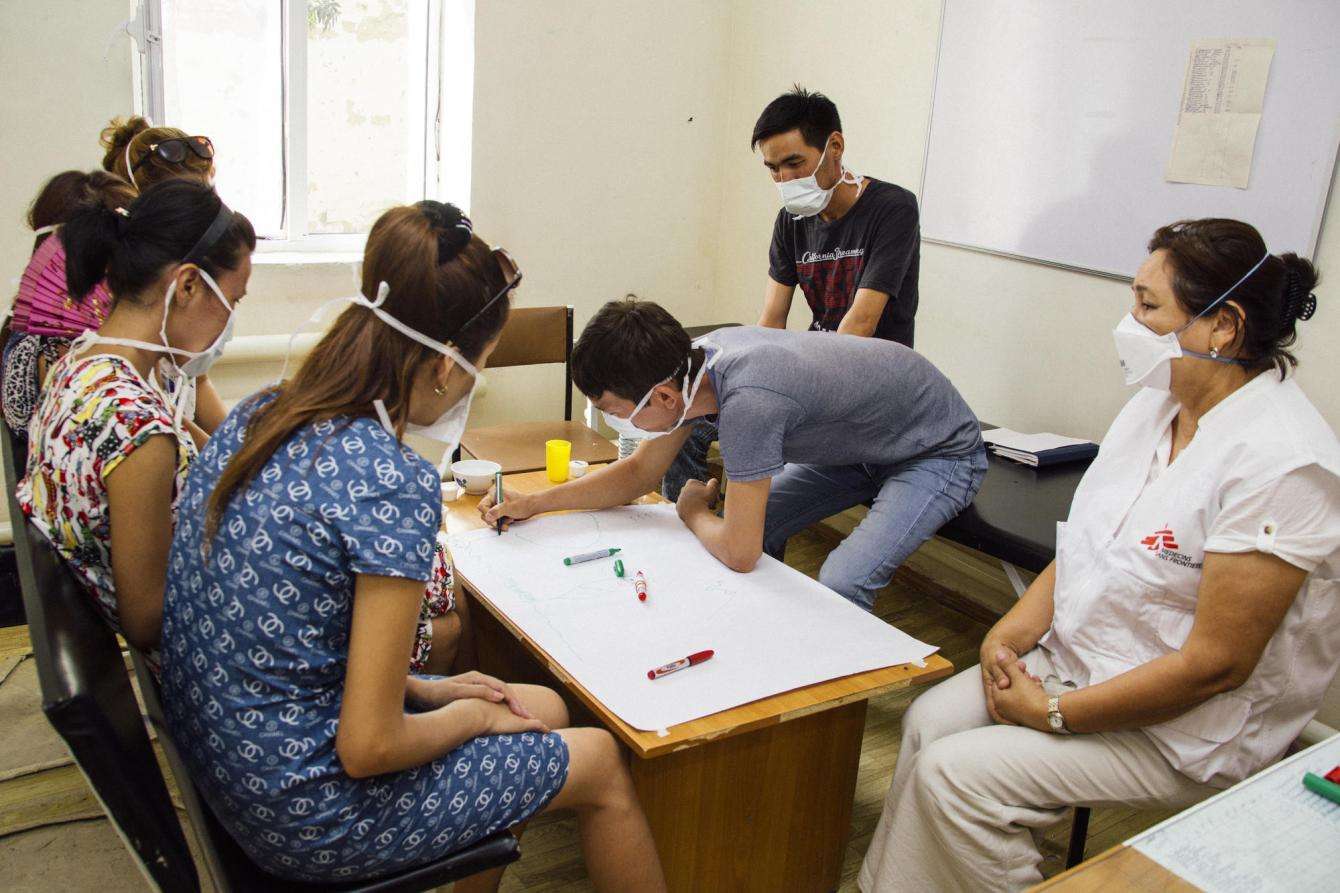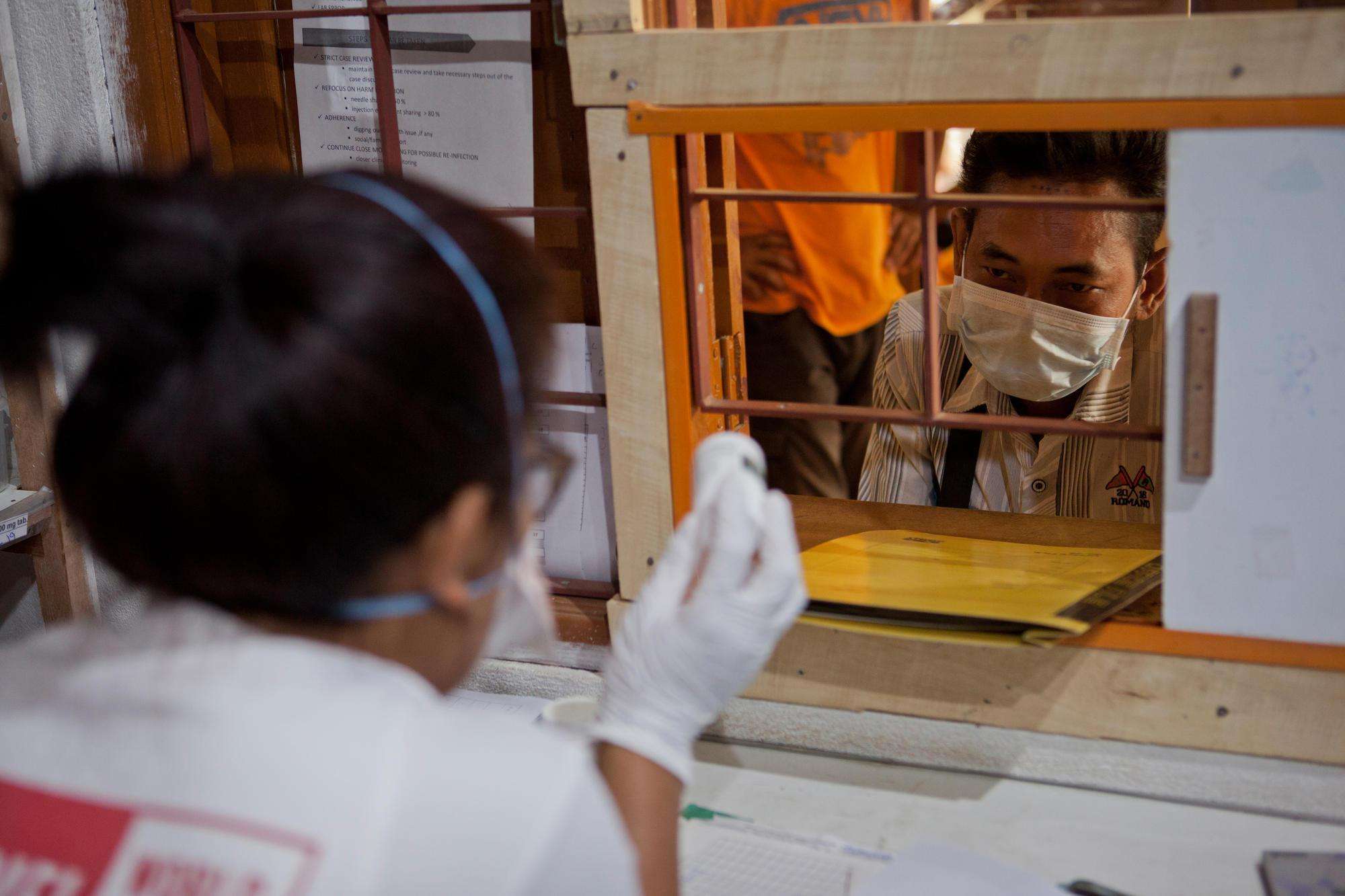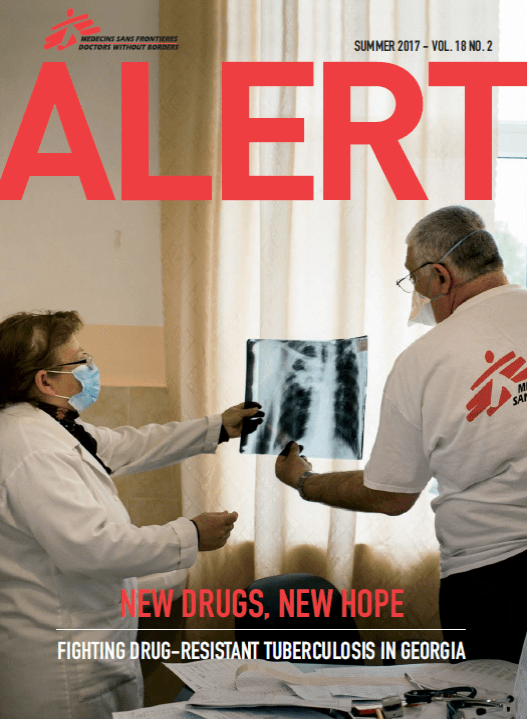GENEVA/NEW YORK, AUGUST 14, 2019–The US Food and Drug Administration (FDA) today approved a combination regimen containing a new drug, pretomanid, for the treatment of extensively drug-resistant tuberculosis (XDR-TB). As the third new drug developed for tuberculosis (TB) in over half a century, and the first to be developed as part of a ready-to-use treatment regimen, pretomanid’s approval represents another potent tool for tackling difficult-to-treat drug-resistant forms of TB. The international medical humanitarian organization Doctors Without Borders/Médecins Sans Frontières (MSF), which provides TB treatment to close to 20,000 people worldwide, stressed that the drug must be made affordable to everyone who needs it, especially considering the substantial taxpayer and philanthropic contributions that went into its development.
The three-drug regimen (BPaL: bedaquiline + pretomanid + high-dose linezolid) was approved today for adult patients with XDR-, treatment-intolerant, or nonresponsive multidrug resistant pulmonary TB. This new drug regimen could dramatically shorten treatment length to six months, greatly reduce the number of pills required, and help to increase XDR-TB cure rates from the current abysmal 34 percent. While the new regimen will be shorter and simpler to administer, optimism around BPaL is balanced against the need for intensive monitoring for side effects from the high doses of linezolid required. Separate clinical trials run by MSF and TB Alliance are underway to further evaluate pretomanid-containing regimens to try to identify safer future treatment options.
“Treatment of XDR-TB has been dire ever since this form of the disease was discovered,” said Jay Achar, infectious disease specialist and TB medical advisor at MSF. “Having access to effective treatment regimens will give people hope for a cure and help limit transmission of this deadly bacteria. While safer, simpler regimens are still needed, the shorter treatment duration of this novel regimen is an important step in the right direction.”
Pretomanid was developed by TB Alliance, a not-for-profit organization, funded by governments (including Australia, Germany, the UK, and the US) and philanthropic sources, with the expectation that the organization would hold true to its stated mission, that they are “dedicated to the discovery, development, and delivery of better, faster-acting and affordable tuberculosis drugs that are available to those who need them.”
In addition, TB Alliance stands to be granted a priority review voucher (PRV). Under the PRV program, when the FDA approves an eligible neglected disease product—a medicine or vaccine—the developer is awarded a PRV. This voucher can be used to accelerate the FDA review of any of the developer’s drugs or vaccines. Alternatively, the developer can choose to sell their voucher to another entity, as has been done previously for as much as $350 million USD. MSF calls for TB Alliance to use this financial reward to ensure that the drug be registered and made available at an affordable price, faster.
“This newly approved regimen containing pretomanid could be a lifesaver for people with XDR-TB, but it’s not time to celebrate yet,” said Sharonann Lynch, HIV and TB policy advisor for MSF’s Access Campaign. “The approval of this new regimen by the US FDA is just the first step. We now need pretomanid to be registered and available at an affordable price in all countries, prioritizing those with the highest TB burden.”
In April this year, TB Alliance granted the first license to the US pharmaceutical corporation Mylan to manufacture, register, and supply pretomanid. To date, TB Alliance and Mylan have not made the price of pretomanid public. It has been estimated that generic versions of pretomanid could be produced and sold at a profit for between $0.36 USD and $1.14 USD per day. The lowest global prices for the other two drugs in the regimen, bedaquiline and linezolid, already run at around $3 USD per day. People needing this treatment regimen would have to take it for six months, amounting to a total price of $548USD, before considering the additional price of pretomanid. MSF has called for treatment of drug-resistant TB (DR-TB) to be no higher than $500 USD per person for a complete treatment course.
But four months on, neither Mylan nor TB Alliance has made the licensing agreement public, despite calls from civil society for transparency on the terms and conditions that will ultimately impact people’s access to this drug globally. Mylan is expected to bring pretomanid to market by January 2020. However, this is dependent on World Health Organization guidance on using the drug, and on Mylan filing for registration in countries with the highest DR-TB burden.
“TB Alliance and Mylan must not squander this opportunity,” said Lynch. “They must make good on TB Alliance’s mandate to deliver affordable treatment—which is why they received the support of government and philanthropic funding that went into the development of pretomanid and this combination—and provide the drug at an affordable, price because when it comes to people with resistant forms of TB, it’s a matter of life or death.”
Pretomanid is part of the same class of drugs (nitroimidazoles) as delamanid—one of the two other TB drugs approved in the last half century—developed by pharmaceutical corporation Otsuka. Delamanid is fraught with access issues: the drug is patented in many countries until 2023, including in India, and the price of a six-month treatment course remains very high (the lowest global price is $1,700 USD), with many people needing the drug for up to 20 months, making the price much higher. If pretomanid is affordable compared to delamanid, it has the important potential to spark competition and reduce prices for this class of drugs.
MSF Clinical Trial
In addition to providing DR-TB treatment in various settings, MSF is conducting research together with partner organizations to develop the evidence base for the therapeutic value of newer DR-TB treatments. In 2017, MSF launched the TB PRACTECAL trial (ClinicalTrials.gov identifier: NCT02589782), a randomized, controlled, multicenter, Phase II/III adaptive trial to evaluate the safety and efficacy of six-month regimens that contain bedaquiline, pretomanid and linezolid (standard dose) with or without moxifloxacin or clofazimine, for the treatment of adolescents and adults with multidrug-resistant (MDR)-TB or XDR-TB. This trial should help inform which combinations of bedaquiline, linezolid and pretomanid-based regimens are effective and safe for the treatment of MDR-TB. The trial is sponsored by MSF and is being conducted in seven sites in Belarus, South Africa, and Uzbekistan. Outcomes from this trial are expected in early 2022.

MSF has been involved in TB care for 30 years, often working alongside national health authorities to treat people in a wide variety of settings, including chronic conflict zones, urban slums, prisons, refugee camps, and rural areas. In 2018, MSF provided TB treatment to 19,400 people, including 2,840 people with drug-resistant forms of TB. As of September 2018, across MSF projects in 14 countries, more than 2,000 people have been treated with the other newer drugs, including 633 with delamanid, 1,530 with bedaquiline, and 227 with a combination of both medicines.





